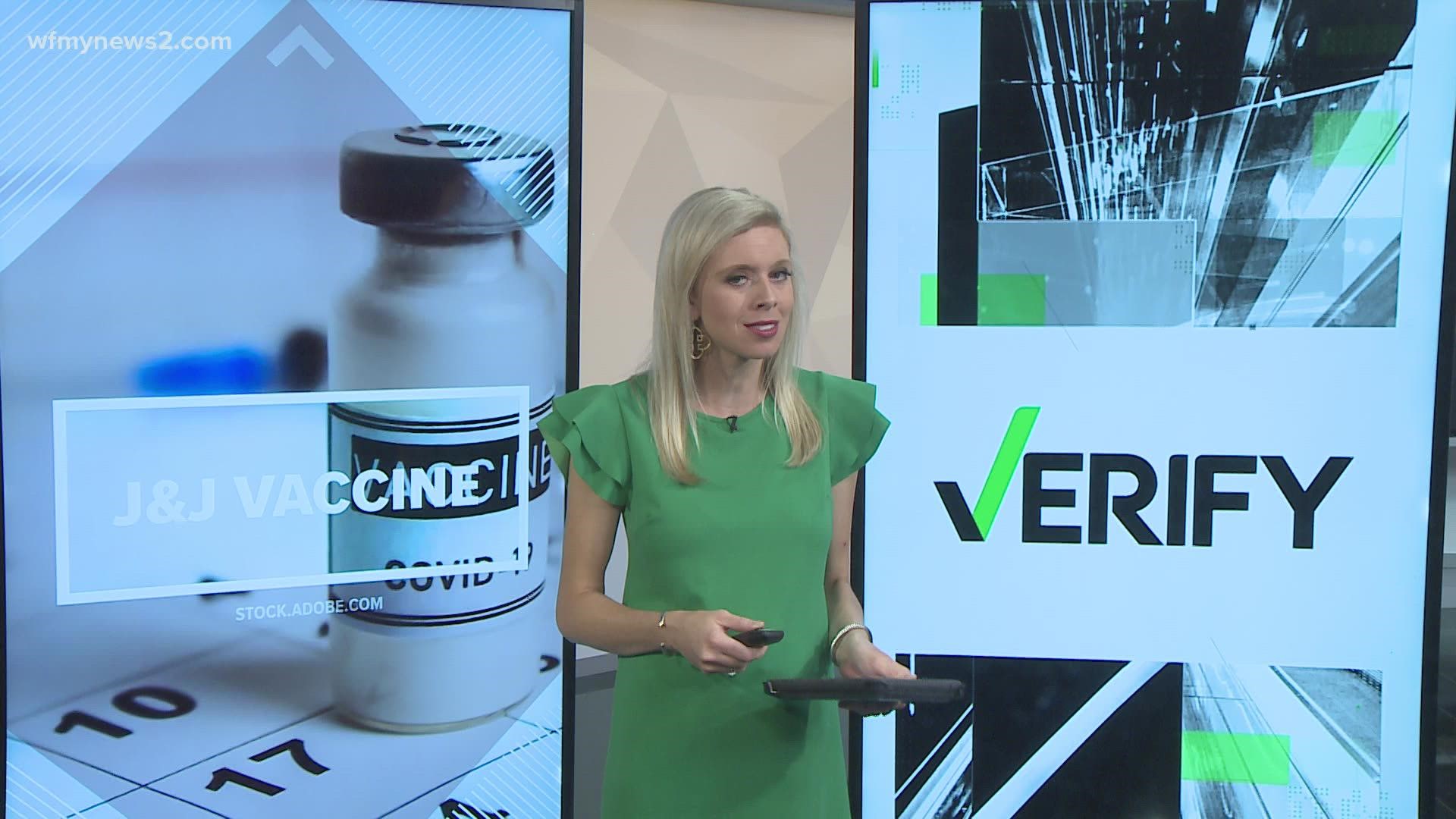WINSTON-SALEM, N.C. — COVID-19 boosters are boosting a lot of questions to the forefront of claims needing verification. The North Carolina Health Department -- and many others -- have authorized clinics to offer third doses of Pfizer and Moderna to people with compromised immune systems.
But, what about the thousands of people who got the Johnson & Johnson (J&J) -- the single-dose vaccine? So far, there is no additional dose available for them.
THE QUESTION
In a major U.S. city, J&J recipients do have an option right now. The San Francisco Health Department is allowing anyone who got the J&J vaccine to get a supplemental dose of an MRNA vaccine -- Pfizer or Moderna. The caveat is they must talk to their doctors first.
So, should everyone who got the J&J vaccine get a supplemental MRNA, if the option becomes available to them?
THE SOURCES
- San Francisco Health Department
- CDC
- Mayo Clinic
- Chris Ohl, MD - Atrium Health Wake Forest Baptist infectious diseases physician
THE ANSWER
No, there is not a federal, state or pharmaceutical recommendation for supplementing a J&J shot with an MRNA. The San Francisco Health Department isn't even formally recommending it, and it's not widely available as an option. If you got the J&J, it's best to wait for guidance from the FDA and CDC.
WHAT WE FOUND
The CDC says there is not enough data to support getting an MRNA vaccine dose on top of the J&J vaccine. The San Francisco Health Department is not even formally recommending it -- rather, the deputy director said it's accommodating requests for it. So, why did this idea even originate?
Research shows J&J has a lower efficacy than Pfizer or Moderna. Mayo Clinic reports it is initially 66% effective at preventing COVID-19, compared to 91% with Pfizer and 94% with Moderna. But, all three drug makers note the vaccine can weaken over time, hence why they acknowledge the potential benefits of boosters.
As of now, the CDC says it's likely people who received J&J will need a booster dose. But, because the J&J came out last, there's not enough data to make that decision.
Infectious diseases physician Chris Ohl, MD, acknowledged, "Some communities are offering a third messenger RNA (MRNA) vaccine to people who've gotten the J&J vaccine. I'm not totally sure that's necessary..."
He noted he also does not think it will become the norm.
"I don't think we're going to see a specific recommendation for providing a messenger RNA vaccine on top of one single J&J vaccine, largely because there's just not much data to know how well it works and about the safety issues," he said.
And, the J&J vaccine is different from Pfizer and Moderna. The CDC explains J&J is a 'viral vector' vaccine, which uses a modified version of a different virus to give instructions to our cells. Pfizer and Moderna are MRNA, which teaches our cells how to make a protein that triggers an immune response. The CDC says the vaccines are not interchangeable -- at least not yet.
Regardless of pending decisions on extra doses, experts emphasize the initial vaccine significantly reduces your chances of serious illness and death from COVID-19. And, if you haven't been vaccinated yet, they say not to get caught up on brand or efficacy -- the best one is the one first available.
If you see a claim on social media, and you want it verified, send a screen shot and short paragraph or selfie video of the question to Meghann Mollerus via:
Facebook: Meghann Mollerus News
E-mail: Mmollerus@wfmy.com
Twitter: @MeghannMollerus

